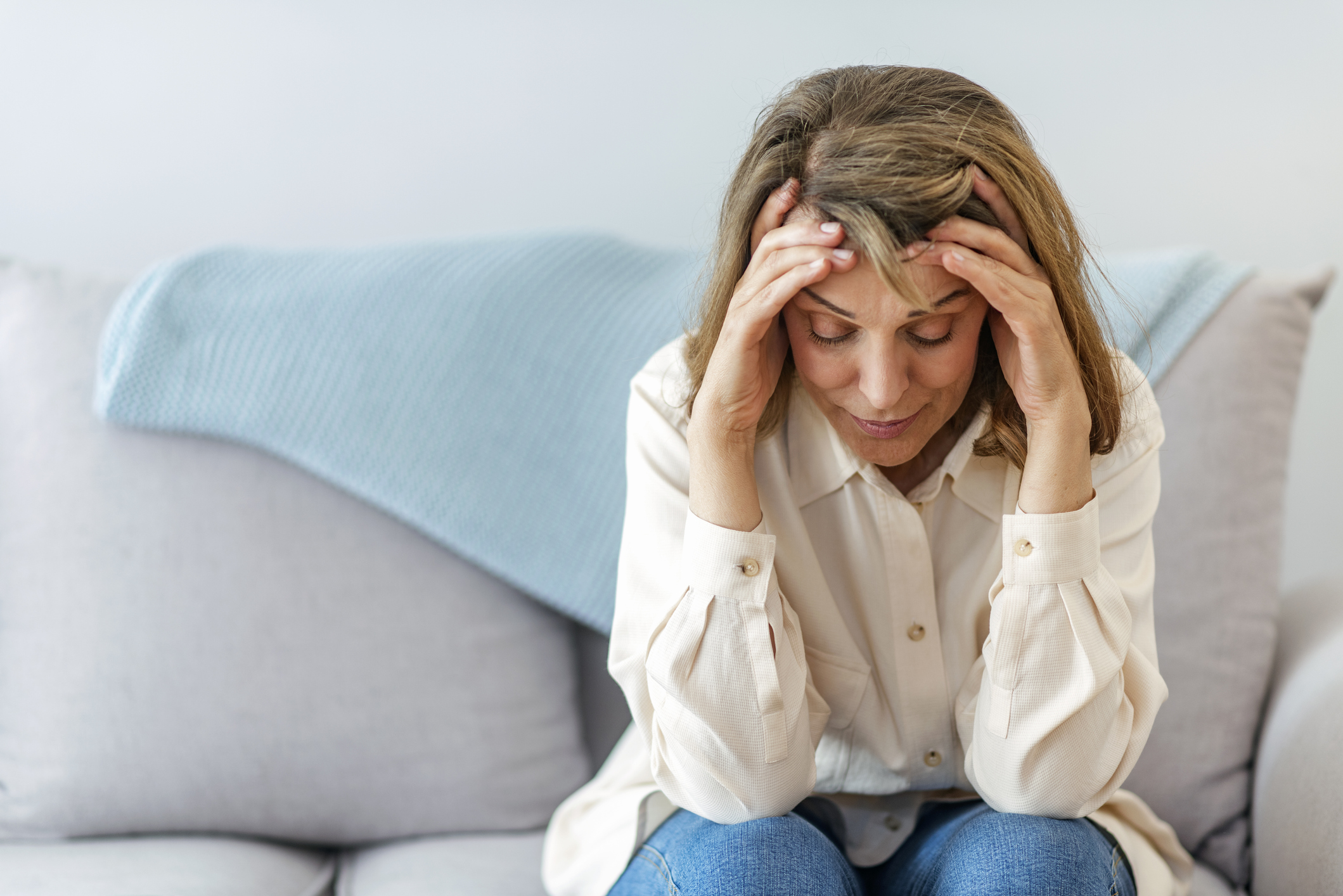Depression and Anxiety Are Normal in the Lead-Up to Menopause
As you approach the age when menopause is likely to begin, you’ll probably know of a few symptoms to watch out for. Hot flashes, night sweats, insomnia—these are commonly discussed and complained about among menopausal women. But what’s not talked about as often—and what should be—is the effect this transitional period can have on your mental wellbeing.
Many women experience feelings of anxiety and depression as they near menopause. Unfortunately, these symptoms aren’t as widely known, which can leave women feeling isolated or like something is wrong with them as they navigate an already complex period of their lives.
Perimenopause, the lengthy period of transition before your final menstrual cycle, causes drastic fluctuations in estrogen and progesterone. These hormone changes are behind most of the undesirable symptoms of menopause, including hot flashes, vaginal dryness, reduced libido, insomnia, hair loss and mood swings. However, for some women, those minor mood swings and periods of irritability worsen into more intense feelings of depression, generalized anxiety and even panic disorders.
Although women may experience temporary feelings of anxiety and depression, prolonged mood disorders are not normal during menopause. If you’re experiencing depressive feelings every day for more than two weeks or have frequent anxiety or panic attacks, you should speak with your doctor. You may need medication for anxiety or depression to help you cope.
How menopausal changes can lead to anxiety and depression
Estrogen and progesterone are not only responsible for regulating your reproductive organs and menstrual cycle. They are also closely linked with chemicals in your brain that affect your mood. The erratic hormone changes that occur during perimenopause may influence the presence of neurotransmitters, which can lead to mood disorders.
Additionally, other side effects of menopause may lead to occasional feelings of anxiety and depression. Hot flashes and insomnia are two common symptoms that interrupt sleep, and a lack of restful sleep can cause or worsen mood disorder symptoms.
Finally, symptoms of mood and mental disorders are often exacerbated by stress. As women approach menopause, they’re likely to experience significant changes in their home lives and lifestyles, including children moving away from home, the loss of parents, career changes and more. These environmental factors can add to your mental load and make depression or anxiety feel more intense.
For some women, these feelings go away on their own once they enter menopause and their hormones level out. However, some women may continue to experience anxiety and depression. even after menopause.
Women who suffered from anxiety or depression before menopause tend to have a higher risk of developing mood disorder symptoms during perimenopause. If you’ve been diagnosed with anxiety or depression in your younger years, it’s important to speak with your doctor when you notice the early signs of menopause. Together, you can create a plan of action to treat any mood disorder symptoms that arise.
Identifying anxiety and depression
As you approach menopause, it’s important to understand the symptoms of mood disorders you should be looking out for.
Depression might be indicated by the following signs:
- Persistent sadness
- Decreased interest in or pleasure from hobbies
- Changes in appetite
- Changes in sleep
- Persistent fatigue
- Irritability
- Thoughts of self-harm or suicide
Anxiety is not the same as depression, but they may occur simultaneously. Symptoms of anxiety or panic disorders may include:
- Persistent fear or worry (often unwarranted or with no explainable cause)
- Sweating
- Inability to focus
- Irritability
- Fatigue
- Insomnia
- Increased heart rate
- Dizziness
- Nausea
- Shortness of breath
Alleviating mood disorder symptoms during menopause
The most important thing you can do when you discover symptoms of anxiety and depression in your daily life is speak with your doctor. Be direct, communicate the type and severity of your symptoms and inquire about the possibility of anxiety and depression.
There are some things you can do in your daily life to help reduce feelings of anxiety and depression, as well.
- Counseling: Many menopausal women experiencing depression or anxiety benefit from seeing a therapist on a regular basis to discuss their feelings and find healthy coping mechanisms. These sessions might be individual or part of a support group.
- Anxiety and depression medication: If your anxiety or depression are causing you significant distress, your doctor may recommend that your take antidepressant or anti-anxiety medication to help control your symptoms. While this isn’t the right choice for everyone, it can be useful for women with clinical depression or a severe panic disorder.
- Routine exercise: Exercise is a great way to relieve stress, release the “happy hormones” in your brain and manage symptoms of anxiety and depression, all while giving your health a boost. Try taking a daily walk or jog, going swimming or taking a fun exercise class.
- Healthy living: Many mood disorder symptoms are worsened by unhealthy choices, such as eating unhealthy food, smoking and drinking alcohol or excessive caffeine. By making healthy choices, you may be able to minimize your symptoms or manage them more effectively.
If you begin to experience anxiety or depression while going through perimenopause, understand that you’re not alone. These feelings are normal and, more importantly, manageable with the right help.



Leave a comment